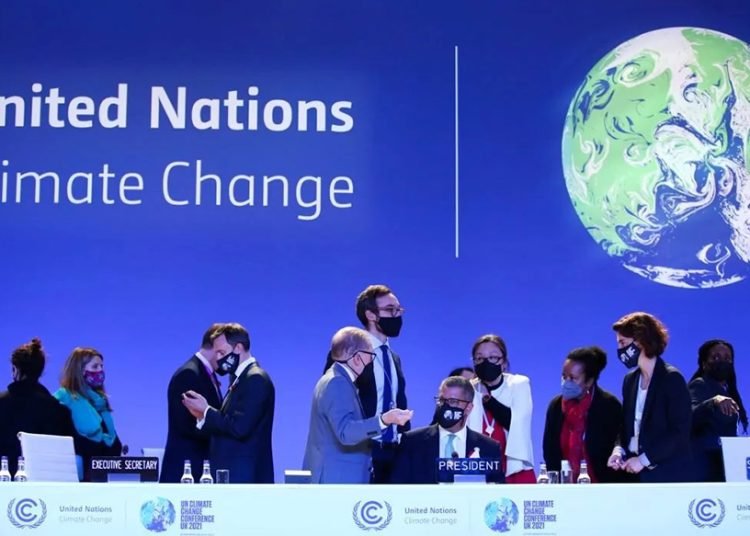Ministers and leaders from more than 40 Climate and Clean Air Coalition (CCAC) countries at the 27th Conference of the Parties of the UNFCCC (COP 27), came together alongside dozens of partners from intergovernmental organizations, businesses, scientific institutions and civil society organizations to announce new collaborative efforts, report actions undertaken at home, and reaffirm their commitment to slashing short-lived climate pollutants (SLCPs) for human and planetary health.
As the devastating impacts of climate change have become increasingly more apparent around the globe, and against a backdrop of the UN Environment’s Emissions Gap report which indicates that we are on a 2.8° C track, the CCAC’s work to reduce SLCP emissions has become more important than ever.
“Reducing short-lived climate pollutants is the fastest solution the world has to reduce global temperatures. From working to secure the Kigali Amendment to implementing the Global Methane Pledge, CCAC has been an instrumental partner in enhancing ambition on these critical greenhouse gases. We congratulate CCAC on a successful year and look forward to moving further and faster together in the year ahead,” said John Kerry, U.S. Special Presidential Envoy for Climate.
The CCAC works to build a healthier, safer, and more prosperous world by crossing the bridge between climate and air quality action, and to harness multiple benefits from the fast mitigation of short-lived climate pollutants, including the protection of ecosystems. Reducing SLCP emissions is the most effective pathway to avoid 0.6 ̊C of predicted global warming in the near term and slow sea-level rise by 20% by mid-century. SLCP reductions can slow the rate of Arctic warming by up to two-thirds and the rate of global warming by half.
“Reducing short-lived climate pollutants such as methane, black carbon, and HFC is one of the surest ways to cut the rate of warming in the near-term, slow self-reinforcing feedback and avoid irreversible tipping points. Thanks to the CCAC, GMI and their partners, these issues have been taken head-on and I want to use this opportunity to call leaders for further action and commitment,” said Dr. Kwaku Afriyie, Minister of the Environment, Science, Technology, and Innovation, Ghana.
New Research
At the Ministerial, two new pieces of CCAC research were launched. EU Commissioner for Energy Kadri Simson launched the new CCAC-UNEP Baseline CH4 Emissions Projections through 2030 report, which shows that the amount of methane in the atmosphere is increasing at record rates and makes an ever-stronger case for urgent action:
- Under business-as-usual scenarios, methane emissions are projected to increase by 5-13% by 2030 from 2020 levels, whereas they need to decline by at least 30% to meet the Global Methane Pledge.
- If global emissions were cut by 30% as set out in Global Methane Pledge, warming would be reduced by at least 0.2 degrees C between 2040 and 2070, compared to baseline projected methane emissions.
- In addition to keeping the planet cool, meeting the Global Methane Pledge would provide additional benefits worldwide through 2050, including:
- Prevention of roughly 5.6 million premature deaths due to tropospheric ozone exposure
- Avoidance of ~580 million tons of yield losses to wheat, maize (corn), rice and soybeans
- Avoidance of ~$520 billion USD in losses due to non-mortality health impacts, forestry, and agriculture
- Avoidance of ~1600 billion lost work hours due to heat exposure
- Slow climate tipping points
Alioune Ndoye, Minister of the Environment, Sustainable Development and of the Ecological Transition, Senegal, announced the CCAC’s forthcoming Integrated Assessment of Air Pollution and Climate Change for Sustainable Development in Africa, a collaboration between the African Union, the CCAC, and UNEP. The Assessment shows how African leaders can act quickly to fight climate change, prevent air pollution, and protect human health. By following the Assessment’s recommended actions to cut air pollution and prevent climate change, African governments can reap many benefits, including:
- Preventing 200,000 premature deaths per year by 2030 and 880,000 deaths per year by 2063
- Cutting carbon dioxide emissions by 55%, methane emissions by 74%, and nitrous oxide emissions 40% by 2063
- Improving food security by reducing desertification and increasing crop yields for rice, maize, soy, and wheat
- Significantly contributing to global efforts to keep warming below 1.5°C and limiting the negative effects of regional climate change
“We are in a climate emergency. Scientists tell us that the only way to protect people is to reduce the rate of warming now. We can achieve this by focusing our efforts on actions that reduce super climate pollutants and build resilience,” said Minister Ndoye. “This is why Senegal joined the CCAC and proposed to create a Working Group to identify the best available, accessible, and affordable technologies to reduce methane. Methane is 80 times more powerful than CO2. Reducing it is one of the best ways to stay below 1.5°C this decade, which is critical for Africa.”
At the Ministerial, leaders reflected on progress made in the one year since the Global Methane Pledge was announced. At this COP, we saw additional countries joining, bringing the count to 140. Over half of the top 20 methane emitters are now part of the Pledge, representing half of global methane emissions and nearly two-thirds of the global economy. The CCAC is a core implementing partner of the Pledge, serving as first port of call for participating countries and providing scientific analysis, advocacy, and technical and institutional strengthening support.
“The science is clear. We are sliding from climate chaos to climate disaster. As we seek to scale up aggressive and ambitious climate action, addressing short-lived climate pollutants is vital,” said Inger Andersen, Executive Director, UNEP. “At COP26 in Glasgow, the Climate and Clean Air Coalition launched the 2030 strategy aiming to step up implementation. It is critical that we see countries now come together to build capacities, tap into solutions that we already have, and implement transformative mitigation actions.”
Ministers also noted the importance of engaging subnational governments, calling on all partners to solicit their engagement, and further welcomed efforts to include gender, youth, and justice considerations into the CCAC’s work. Ministers recognized the CCAC’s strong leadership role globally on Clean Air, especially the role played in raising further awareness in the context of the International Day on Clean Air for blue skies, and noted efforts supported by the CCAC on transboundary air pollution, welcoming this work as a step to improve the science-policy interface and further scientific advocacy for action on air quality.
Ministers also expressed support for increased energy efficiency in the cooling sector while transitioning away from HFCs, welcoming the ratification of the Kigali Amendment to the Montreal Protocol from at least 6 nation states in 2022. More than half of the first 20 Parties who ratified the amendment and thus brought it into force were CCAC State Partners. Additionally, ministers acknowledged the CCAC’s work with the private sector, including a brand-new guide to include air pollution into inventories and actions across supply chains.
New Announcements
Ministers from several countries announced new commitments to the CCAC Trust Fund, and encouraged countries in a position to do so to make additional pledges. Among these was a pledge from the US, CCAC co-chair, who said that the “United States is proud to announce our intention to provide $3 million to the Climate and Clean Air Coalition, subject to Congressional notification and the completion of domestic procedures.”
Additionally, the CCAC presented the brand-new 2021-2022 Annual report which looks at the work done over the past year to set the Coalition up to achieve the 2030 strategy. Ministers encouraged developing countries to respond to the CCAC’s Expression of Interest process to identify potential new projects that address CCAC priorities. Ministers reaffirmed their commitments to supporting innovative, new ways to advance mitigation. Senegal suggested the formation of a Technology and Economic Assessment Panel on Methane, which was met with approval. The Coalition emphasized that the oil and gas sector will need to achieve the fastest and deepest methane emissions reductions to stay aligned with a 1.5C trajectory, and reconfirmed their intent to continue to work within the sector to realize the significant mitigation potential. Finally, the Coalition of ministers requested that CCAC partners work together develop a concept for a program or activities, including regional cooperation and agreements, on ‘clean air action’ to launch at the 2024 CCAC Ministerial.






























































